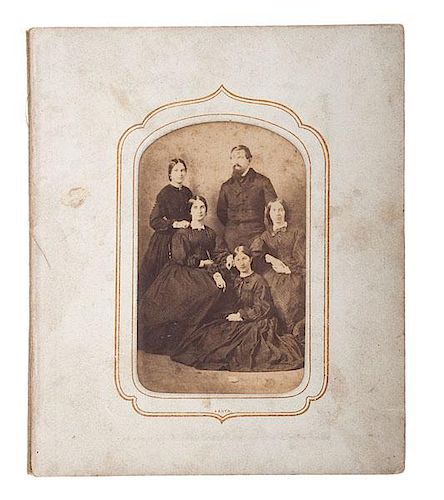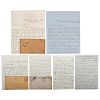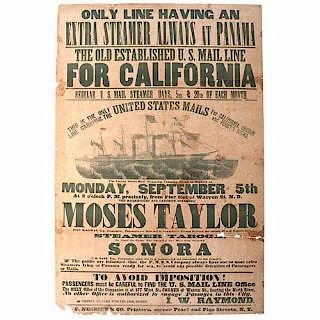Civil War Archive of Noted Actor and Elocutionist James E. Murdoch and Family, Incl. Letters from General Horatio P. Van Cleve and Colonel Reuben D. M
About Seller
6270 Este Ave.
Cincinnati , OH 45232
United States
With offices in Cincinnati, Cleveland and Denver, Cowan’s holds over 40 auctions each year, with annual sales exceeding $16M. We reach buyers around the globe, and take pride in our reputation for integrity, customer service and great results. A full-service house, Cowan’s Auctions specializes in Am...Read more
Two ways to bid:
- Leave a max absentee bid and the platform will bid on your behalf up to your maximum bid during the live auction.
- Bid live during the auction and your bids will be submitted real-time to the auctioneer.
Bid Increments
| Price | Bid Increment |
|---|---|
| $0 | $25 |
| $500 | $50 |
| $1,000 | $100 |
| $2,000 | $250 |
| $5,000 | $500 |
| $10,000 | $1,000 |
| $20,000 | $2,500 |
| $50,000 | $5,000 |
| $100,000 | $10,000 |
About Auction
Jun 10, 2016 - Jun 11, 2016
Cowan's Auctions dawnie@cowans.com
- Lot Description
Civil War Archive of Noted Actor and Elocutionist James E. Murdoch and Family, Incl. Letters from General Horatio P. Van Cleve and Colonel Reuben D. Mussey, Jr. Pertaining to the Death of his Son at Chickamauga
Lot of approx. 112 letters plus supplementary research material from the Murdoch family including 63 letters from noted elocutionist and actor James E. Murdoch (also spelled Murdock), papers and letters related to and from his son Captain Thomas Murdoch, DOW at Chicakamauga, and deeply personal letters from Civil War General Horatio Van Cleve and Colonel Reuben D. Mussey Jr. mourning Thomas' death. Ca 1845-1879.
James E. Murdoch was a famous Shakespearean actor and elocutionist who was loved by Lincoln. Murdoch was born in Philadelphia, PA on January 25, 1811 to a book binder. He first appeared on stage in 1829 and enjoyed a successful career. In 1831, he married Eliza Middlecott, the daughter of a successful London silversmith. He and his wife had six adoring children (Rosaline, James Jr., Thomas, Ida, Fanny, and Lilly) who wrote often. A year after their marriage, Murdoch mistakenly took too much arsenic as a cure for indigestion. The poison plagued him with poor health for the rest of his life. Despite his precarious condition, he continued to perform all over the world.
In 1845 Murdoch played one of his most famous roles as Hamlet at the Park Street Theater in New York obliging him and Eliza to travel often and leave some of their children behind at home. Sometimes the children traveled with their parents. Ida traveled with Murdoch and his wife to London and described to Fanny about the city and the Queen. The constant travel of their father was not easy on the children. Eliza and James Jr. wrote to them often but they longed for their return. Business sometimes prolonged their separation, even during the holidays. In an 1850 letter, Murdoch wrote to his daughters:
I did not play my engagement at the Nealment(?) which was to have commenced on the 2nd on account of illness, and by the advice of Doctor McCalilode who told me I must rest. In consequence of this I am compelled to wait until the 23rd of the month or start for the West without acting- This I could not afford to do- and as a matter of necessity- I must remain- This deprives me of the pleasure of spending the holidays with my dear daughters…I am sure that both of you [Ida and Rose] will not shed one tear over the matter, but say “my dear father if you can bear the disappointment, why so will your daughters and do so cheerfully”…(Germantown, December 10, 1850).
His talents allowed him to mingle with famous people and politicians. He attended lavish parties and wrote to his wife about the impressive food and guests. After a performance in Washington, a senator of California, Milton Latham, held a party in his honor. Lincoln would have been present not for the loss of his son which keeps him from society, wrote Murdoch (Baltimore).
Murdoch retired in 1860 only to exit retirement early in 1861 to perform and raise money for wounded soldiers. His daughter Rose wrote to her sister Ida, His Hamlet drew the smallest but most select audience, He read Drake’s “American Flag” & M E Samrer’s(?) “Union” the both brought down storms of applause proving that all patriotism is not yet extinct… (February 3, 1861). Murdoch's two sons, James Jr. and Thomas, both enlisted in the war. Little did he know that one of his sons became one of the many wounded and the other counted among the dead.
Thomas, Murdoch's youngest son, enlisted at the age of 20 in 1861 and mustered into the 13th OH Inf. Co. I as a sergeant. Two months after Thomas’ enlistment, the eldest son, James E. Murdoch Jr., enlisted as a 2nd lieutenant and mustered into the 2nd OH Inf. Co. I. James Jr. rose to the rank of captain and earned a position on Colonel Joshua W. Sill’s staff. The brothers fought bravely at the Battle of Stone’s River, and Thomas’ efforts during the battle earned him the promotion to captain and a position on General Horatio Van Cleve’s staff. James Jr. had the honor of announcing the promotion to him. After the battle their regiments parted ways. James Jr.’s regiment fought its way through parts of Tennessee against Morgan’s men and Thomas’ regiment fought at Shiloh and Corinth. The brothers fought on the same battlefield again at Chickamauga, but only one survived. General Horatio Van Cleve wrote a personal letter to James Murdoch, Sr.:
It is with heart felt sorrow that I convey to you the sad intelligence of the death of your noble boy, Capt. Thomas Murdock, of my staff. He was struck down by my side, while gallantly cheering my men on our desperate struggle against overwhelming numbers on the 19th instant. After his fall he survived for a time and was conveyed to the field Hospital at Crawfish Spring which subsequently fell into the hands of the enemy…His loss is deeply felt by my Division and by all who knew him in the army I have in this your affliction the warmest of sympathy of a father who knows what it is to be afflicted (Camp Chattanooga, Tennessee, September 25, 1863).
Reuben D. Mussey Jr. also wrote to Murdoch:
I beg permission to mingle my tears with yours over your brave noble son Captain Murdoch…His faithfulness, his intelligence, his painstaking, his accuracy, his patience as Assistant Commissary of Musters I officially commended. But his high sense of honor, his mirthfulness, his generous temper, his affectionate nature, his brave patriotism—for these no official word suffices Endeared by them to me, as to all who knew him, I felt his friendship, as well as honor, as a solace and a delight…(Nashville, October 3, 1863).
Grief consumed the Murdochs, and letters poured in from friends and family expressing their sympathies. A deed to Thomas’ plot at Spring Grove Cemetery, his muster rolls, a commission, his military paperwork, a drawing sketched by him of a Union soldier, three letters of recommendation, a clipping announcing his death, and five letters to his sisters during the war are offered in this lot. James Jr. survived the war, but not unscathed. He was discharged for a disability in 1863.
The grief of losing a son did not stop Murdoch and his work. He tirelessly attended more speaking engagements but the constant travel and sense of loss drained him. In a letter to his daughter, Ida, he wrote:
I am not well-every thing goes wrong with my engagements Phila I had to discount largely…[In Washington] I have stopped short- no lady to support me…the labor of hours of rehearsing and my very low spirits has caused me to throw up the engagement- I must rest at least from the stage labor (Washington, November 8, 1864).
After the war Murdoch returned to his farm near Cincinnati and “semi retired.” He remained in the city until his death in 1893. Murdoch, OH, an unincorporated township near Maineville, was renamed in his honor.
The rest of the documentation in the archive is comprised of extensive research on the family as well as letters to and from the previous owner about the archive.All the letters are in very good condition and many contain their original envelopes, they are organized into individual folios with labels of the dates and names of the sender and receiver.Condition
- Shipping Info
-
SHIPPING. At the request of the buyer, Cowan's will authorize the shipment of purchased items. Shipments usually occur within two weeks after payment has been received. Shipment is generally made via UPS Ground service. Unless buyer gives special instructions, the shipping method shall be at the sole discretion of Cowan's Auctions, Inc.. Cowan's is in no way responsible for the acts or omissions of independent handlers, packers or shippers of purchased items or for any loss, damage or delay from the packing or shipping of any property.
-
- Buyer's Premium



 EUR
EUR CAD
CAD AUD
AUD GBP
GBP MXN
MXN HKD
HKD CNY
CNY MYR
MYR SEK
SEK SGD
SGD CHF
CHF THB
THB
















